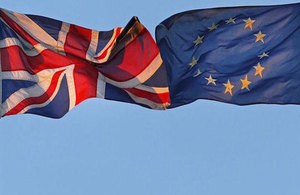The UK government has published a series of technical notices which set out plans to be put into place in the unlikely situation the UK leaves the EU without a deal.
The Department for Transport (DfT) has published 6 documents.
This information demonstrates the potential impact a no deal scenario will have on areas of transport policy, including the haulage industry and those driving in and flying to and from Europe.
The government remains confident of a deep and special partnership with the EU following exit and a mutually advantageous deal with the EU continues to be the most likely outcome.
But the DfT is making the sensible step of putting in place contingency measures to ensure holidaymakers and businesses can continue to travel and export after Brexit.
UK citizens planning a trip to Europe in the short term do not need to take immediate action. The government will set out clearly and in good time what additional steps may be required.
For business, a more proactive approach will be necessary to ensure new procedures are in place for March 2019 and details are given in the notices.
Included in measures recommended by the government today are:
- hauliers may want to take steps now to prepare for future permitting and trailer registration requirements, and to ensure drivers have the right documentation; and
- the aviation industry should review potential implications for supply chains and staff with specialist qualifications.
The government will set out additional practical measures for other transport sectors in due course.
These notices are in addition to the ongoing active engagement we continue to have with stakeholders across transport to discuss impacts and opportunities from EU Exit. These discussions will continue.
Throughout the whole of the Brexit process, the government’s aim has been to ensure that all travel – whether business or personal – remains as friction-free as possible after we leave the EU. It is our intention to recognise EU standards of security and safety and expect our European partners to do the same. It is clearly in our mutual interests to do so.
You can now read technical notices on:
- Driving in the EU if there’s no Brexit deal
- Vehicle insurance if there’s no Brexit deal
- Commercial road haulage in the EU if there’s no Brexit deal
- Reporting CO2 emissions for new cars and vans if there’s no Brexit deal
- Aviation security if there’s no Brexit deal
- Aviation safety if there’s no Brexit deal
- Flights to and from the UK if there’s no Brexit deal
- Getting an exemption from maritime security notifications if there’s no Brexit deal
- Recognition of seafarer certificates of competency if there’s no Brexit deal
- Vehicle type approval if there’s no Brexit deal

